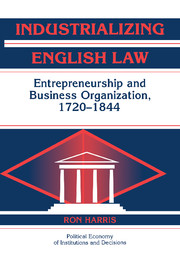Book contents
- Frontmatter
- Contents
- List of Tables
- Acknowledgements
- Introduction
- 1 The Legal Framework
- PART I BEFORE 1720
- PART II 1721–1810
- PART III 1800–1844
- 8 The Attitudes of the Business Community
- 9 The Joint-Stock Company in Court
- 10 The Joint-Stock Company in Parliament
- Conclusion
- Appendix 1 The Rise and Decline of the Major Trading Corporations
- Appendix 2: Capital of Joint-Stock Companies Circa 1810
- Bibliography
- Index of Cases
- Index of Statutes
- General Index
8 - The Attitudes of the Business Community
Published online by Cambridge University Press: 12 August 2009
- Frontmatter
- Contents
- List of Tables
- Acknowledgements
- Introduction
- 1 The Legal Framework
- PART I BEFORE 1720
- PART II 1721–1810
- PART III 1800–1844
- 8 The Attitudes of the Business Community
- 9 The Joint-Stock Company in Court
- 10 The Joint-Stock Company in Parliament
- Conclusion
- Appendix 1 The Rise and Decline of the Major Trading Corporations
- Appendix 2: Capital of Joint-Stock Companies Circa 1810
- Bibliography
- Index of Cases
- Index of Statutes
- General Index
Summary
The business community was not monolithic in its attitude toward the joint-stock company and the concepts attached to it. Several studies have emphasized the division within the business-oriented middle class between the northern industrialists and the City merchants and financiers, and the dominant position of the City in politics and in the economy. This chapter argues that as far as the attitude toward the joint-stock company is concerned, an additional dimension should be added, the division within the City of London between various groups of businessmen. This chapter first deals with the social and economic identity of the promoters of joint-stock companies and their adversaries. The rival interests over the question of trade and corporate monopoly are then studied. The advance of the joint-stock company into new sectors during market booms and with the introduction of new technology is then surveyed. Finally, the change in negative attitudes toward the share market is explained in light of the advance of the market and the widening circle of investors.
THE PROMOTERS OF THE NEW COMPANIES AND THEIR FOES
A considerable number of joint-stock entrepreneurs appeared near the turn of the nineteenth century. They were concentrated in London and involved in the promotion of the dock and water supply companies of that period. In the boom year of 1807, some forty-two new companies were formed, most in London, and mainly in the fields of insurance, brewing, food production, and metal manufacturing.
- Type
- Chapter
- Information
- Industrializing English LawEntrepreneurship and Business Organization, 1720–1844, pp. 201 - 229Publisher: Cambridge University PressPrint publication year: 2000



